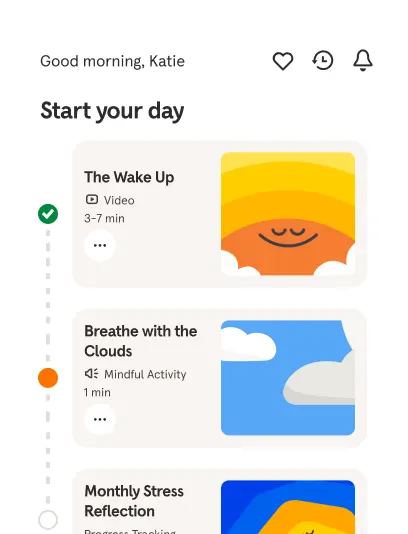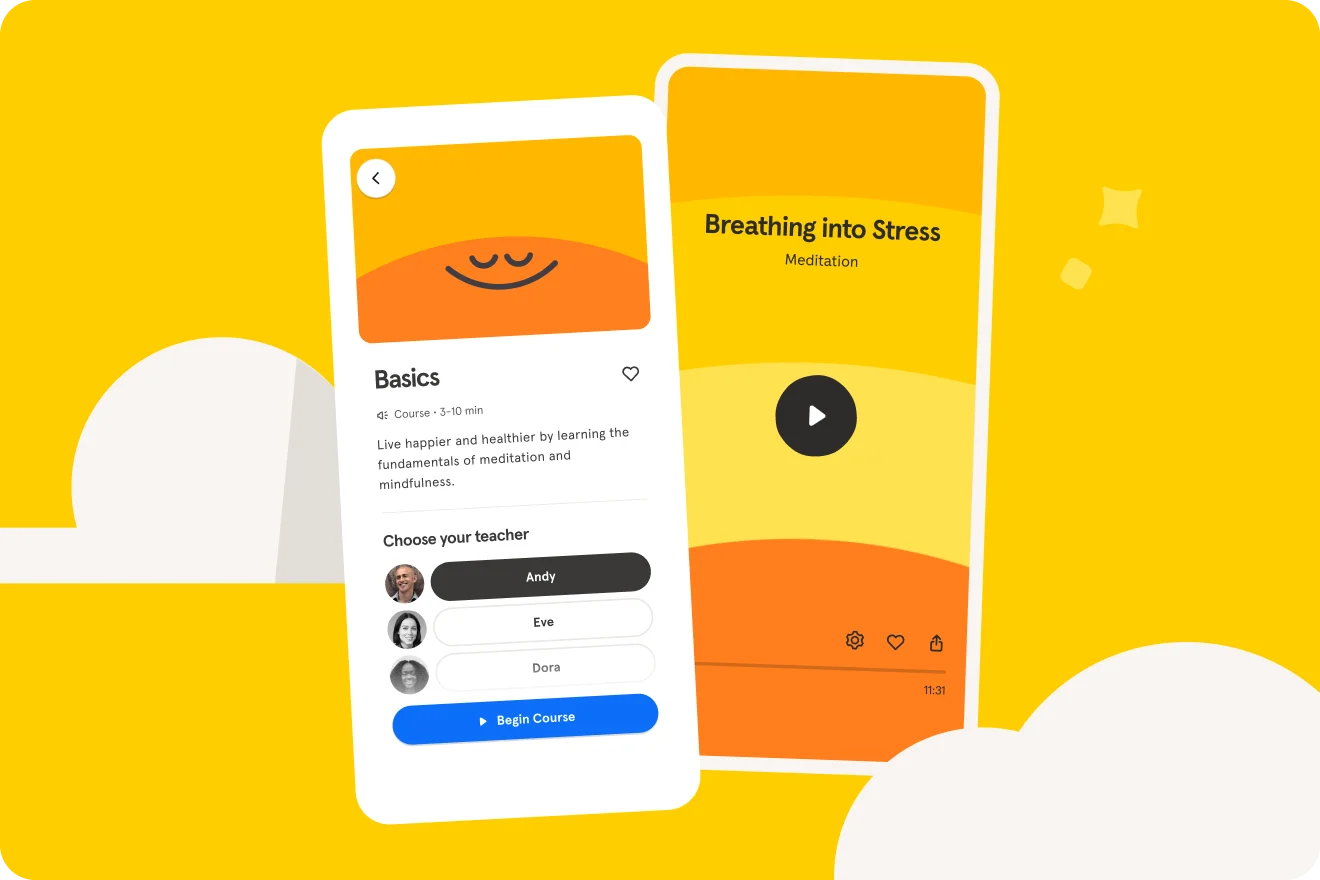Breathe Through Anxiety
Soothe anxiety and balance your mind with slow, patterned breaths.
Try 14 days freeBetter mental health starts with Headspace. Unrivaled expertise to make life feel a little easier, using guided meditations, mindfulness tips, focus tools, sleep support, and dedicated programs.
Try 14 days free
Details
About your teachers
- More about Andy
A former Buddhist monk, Andy has guided people in meditation and mindfulness for 20 years. In his mission to make these practices accessible to all, he co-created the Headspace app in 2010.
- More about Eve
Eve is a mindfulness teacher, overseeing Headspace’s meditation curriculum. She is passionate about sharing meditation to help others feel less stressed and experience more compassion in their lives.
- More about Dora
As a meditation teacher, Dora encourages others to live, breathe, and be with the fullness of their experiences. She loves meditation’s power to create community and bring clarity to people’s minds.
- More about Kessonga
Kessonga has been an acupuncturists, therapist, and meditation teacher, working to bring mindfulness to the diverse populations of the world.
- More about Rosie
Rosie Acosta has studied yoga and mindfulness for more than 20 years and taught for over a decade. Rosie’s mission is to help others overcome adversity and experience radical love.

Your lifelong guide to better mental health
Stress, sleep, and all the challenging emotions — care for your mind with the everyday mental health app that's shown to make a difference.
Try 14 days free
Look after your mind
Proven guided meditations and programs to help you stress less, sleep more soundly, and better navigate life’s challenges

Science-backed
Studies show that using Headspace for 30 days can reduce stress, increase resilience, and improve overall well-being

Explore 1000+ expert-led exercises
Access our library of meditations, breathing exercises, and guidance videos for stress, sleep, focus, everyday anxiety , parenting, and more.
Member reviews
Hear from some of our members
Your app brings so much peace and tolerance to our home.
Rachel
UK
Changing my thoughts has allowed me to change my life.
Davide
London
The stress and loneliness courses … taught me how to comfort myself.
Alicia
Canada
Headspace provides me with … a connection to myself, and a disconnection from negative thoughts, feelings, and sensations.
Keri
UK
Frequently asked questions
When everyday anxiety kicks in, the sympathetic nervous system goes into its fight or flight response and your breathing becomes more shallow and rapid, otherwise known as anxiety breathing. That’s when breathing exercises for anxiety can help. Because when you slow down and consciously pay attention to how you are breathing — inhaling/exhaling in a controlled way — your attention switches from the anxiousness and onto the breath. As a result, the “rest and digest” branch of your system (the parasympathetic nervous system) is activated, allowing you to breathe easier and feel calmer. So yes, changing the way you breathe can change the way you feel.
Deliberately slowing down to ease rapid, shallow anxiety breathing is key when you start to feel anxiousness creeping in. Any breathing exercise for anxiety that invites taking slow, long, deep breaths can activate the “rest and digest” part of the parasympathetic nervous system. You are essentially swapping the stress response for the relaxation response. You could practice box breathing, for example, or practice deep breathing in a controlled manner, for 5-15 minutes, resulting in more oxygen reaching the lung which, in turn, restores a sense of calm.
Anxiousness at any level can trigger the sympathetic nervous system — otherwise known as the fight or flight response — and your breathing can become shallow and rapid; some people might even feel they are hyperventilating. That’s why breathing exercises for anxiety can be so helpful, because you take slow, long, deep breaths — in through the nose, out through the mouth — to oxygenate the body which means breathing easier which, in turn, means feeling more relaxed.
A sure-fire way to help ease any shortness of breath caused by a sense of heightening anxiety is to make your exhales longer than your inhales. The Breathe Through Anxiety meditation helps with this, and it’s designed to slow down your heart rate as well as any racing thoughts. So follow the guidance and breathe in slowly through the nose to the count of 4, hold that breath for 7 seconds, and exhale through the mouth to the count of 8 (you can moderate the counts based on personal preference), and repeat until you feel calmer.
- © 2024 Headspace Inc.
- Terms & conditions
- Privacy policy
- Consumer Health Data
- Your privacy choices
- CA Privacy Notice

